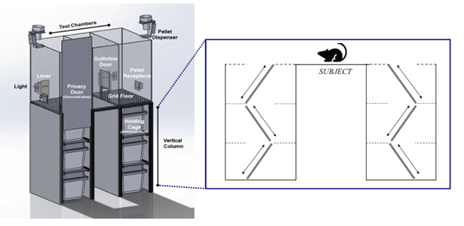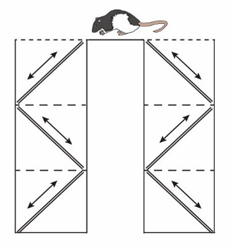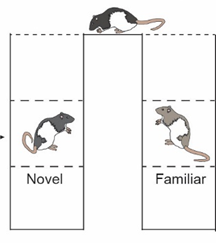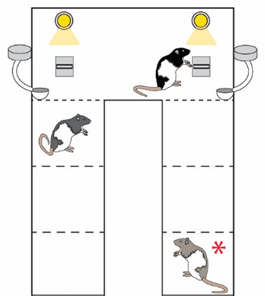Overview
The ability to understand, create and maintain social relationships is a fundamental part of life. Emerging research shows there is a critical link between the social networks we create and our spatial cognition. For example, social relationships are often described in terms of space, varying from “close” to “distant.” In exploring the mechanistic basis for this connection, it is vital to utilize animal models such as rats, which are both highly social and excellent spatial navigators. However, current apparatuses to house and perform testing on rodents are restrictive in their design, limiting their use as a translational animal model to study social and spatial cognition together. To overcome this, we have developed a 3D modular apparatus called the Vertical Maze, which enables rodents to explore social stimuli while under spatial demands; researchers to have precise control over visual, olfactory and auditory experience of the rodents; and examinations to be performed which span across both spatial and social domains, as well as study their connection.
Market Opportunity
Understanding the mechanisms of social and spatial cognition within rodent models has important implications in studying human stress, anxiety, autism, evolution and aging. Yet, there are currently no apparatuses that exist in which social and spatial domains of rodents can be tested concurrently. Instead, these domains must be tested separately, ignoring their significant relationship with each other. For example, a small number of apparatuses are used in social cognitive testing in rodents, none which incorporate spatial cognition. Often, these apparatuses have small holding cages, risking stress and behavioral confounds, as well as lack distinct subregions for confinement and freedom. Further, nearly all apparatuses for spatial cognitive studies employ a horizontal design, ignoring the inherent behavior of rats to investigate what is underneath them. The majority of available tests rely on spontaneous behavior, as opposed to operant learning which is critical for tests required longer trial sets and precise behavioral measures. Of the operant conditioning paradigms that do exist, none include both spatial and social decision making. Such limitations significantly hinder the ability of researchers to study cognition in the rodent model.
Innovation and Meaningful Advantages
Our technology addresses the current limitations of rodent apparatuses in studying both social and spatial cognition by engineering a modular maze that can measure spatial and social behavior both separately as well as combined. The Vertical maze includes an upper testing platform for subjects and lower vertical columns for social stimuli positioned at three distinct spatial distances. Spatial exploration is possible via ramps within each vertical column to generate distinct, interconnected levels. Social exploration is achieved when subjects perceive social partners underneath them through a grid floor in either testing chamber. While other apparatuses limit rodent spatial exploration or require rodent social partners to be confined in small holding cages which may be stress-inducing, our technology uses large, interspersed holding cages which can be used to study rodent cognitive mapping, social patterns and exploration in 3D. Importantly, this system is able to measure complex decision-making, as well as spontaneous single interactions, by incorporating a variety of operant conditioning tools including automated levers, lights, reward dispenser, guillotine doors and interchangeable flooring. Versatile in design, the Vertical Maze represents a much-needed system for direct comparisons of spatial and social behavior in a single environment. This system can thus be utilized by any researchers focused on the neural basis of cognition in the rodent model.




Collaboration Opportunity
We are interested in exploring research collaborations and licensing opportunities
Principal Investigator
Rebecca Burwell, PhD
Professor of Cognitive, Linguistic and Psychological Studies
Brown University
rebecca_burwell@brown.edu
https://vivo.brown.edu/display/rburwell
IP Information
PCT/US23/15485
Taking Control of a Rat’s Sense of Familiarity and Novelty, Dr. Rebecca Burwell’s work has been featured in Neuroscience News. September 30, 2015.
Contact
Neil Veloso, PhD
Executive Director
Brown Technology Innovations
neil_veloso@brown.edu
Brown Tech ID 3185